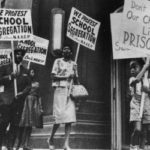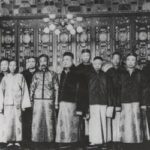How do educators invest in productive, deep, and transformative dialogue in their classrooms? Civic Conversations is a collaboration between the Edward M. Kennedy Institute’s civic education programming and the community-building dialogic structure practiced by Essential Partners. Explore resources, activities, and lesson structures that support educators as they facilitate difficult conversations, create inclusive learning environments, raise complex discussions, and promote a safe space for students to consider their values and engage in their communities. Policy simulations at the Kennedy Institute reflect the wide range of issues that face our country today. Students debate the best way to reform our immigration system, consider the balance between privacy and security, and think about how to meet the challenge of climate change. As in the real Senate, it’s natural that students will disagree on the best approach to many civic issues. This collection of resources will support educators as they prepare to discuss civic issues, either in preparation for a Kennedy Institute field trip or to practice listening, sharing, and learning in the classroom.
Civic Conversations
How do educators invest in productive, deep, and transformative dialogue in their classrooms? Civic Conversations is a collaboration between the Kennedy Institute’s civic education programming and the community-building dialogic structure practiced by Essential Partners. Explore resources, activities, and lesson structures that support educators as they facilitate difficult conversations, create inclusive learning environments, raise complex discussions, and promote a safe space for students to consider their values and engage in their communities.
How to Have a Civil Civic Conversation
Filmed on a Constituting America Winner Mentor Trip, five young ladies share their thoughts on how to agree to disagree and how to have a discussion and still remain friends. Through personal experience these students have learned a lifelong lesson. Enjoy learning their lessons while you discuss yours. When watching you will see each person’s name, title and number. The number is their age. The title is the contest area they won in the We the Future contest. Check out the website for the contest information. Who knows maybe soon you will see your talent on the Civics Renewal Network and Constituting America!
Civic Art Project: Considering Leadership
The materials in this curriculum packet are designed to be a classroom resource, a guide to think about the qualities of good leadership, and a creative prompt to create a political poster representing leadership and sharing a vision for the future. Teach your students about elections, help them consider issues that matter to them, and watch as they lend their voices to our national conversation about leadership.
A Conversation with U.S. Supreme Court Justice Ruth Bader Ginsburg on Women & the Constitution
The Power of One Decision: Brown v. Board of Education

When minority students decided to take their challenge of the “separate but equal” doctrine to the Supreme Court, the 1954 decision handed down by the court in Brown v. Board of Education and enforced by the executive branch, changed their lives and America forever. In this lesson plan, based on the Annenberg Classroom video “A Conversation on the Constitution: Brown v. Board of Education,” students gain insight into decision-making at the Supreme Court, learn about the people behind the case, construct a persuasive argument, and evaluate the significance of Brown v. Board of Education.
The 2015 Baltimore Riots: A Teachable Moment

The Newseum believes that improving civic education has the power to improve our schools, communities and our democracy. The Baltimore unrest can be an entry point in your conversation with students.
The Newseum has numerous resources to help teachers broach this topic in the classroom. Lesson plans, videos and activities guide students in how civil rights issues have been represented in the media over many decades. And how citizens, including young people, can develop a voice and use the freedoms of the First Amendment to effect change and inspire action.
Freedom of Speech: Finding the Limits
As part of the Bill of Rights, freedom of speech is guaranteed by the Constitution, but it is not defined by it. That task is left up to the people through a representative government that makes the laws and a judicial system that interprets and applies the laws to resolve disputes. In this lesson, based on the Annenberg Classroom video “A Conversation on the Constitution: Freedom of Speech,” students gain insight into the many challenges involved in defining and protecting free speech. They also learn about principles that come from Supreme Court decisions and case law that are applied to define the limits for us today.
Yick Wo and the Equal Protection Clause

This documentary examines the case Yick Wo v. Hopkins (1886) in which the Supreme Court held that noncitizens have due process rights under the Fourteenth Amendment’s equal protection clause. A PDF lesson plan accompanies the video. The video A Conversation on the Importance of the Yick Wo Case complements the documentary.
